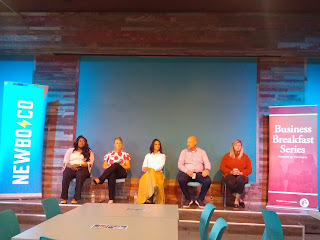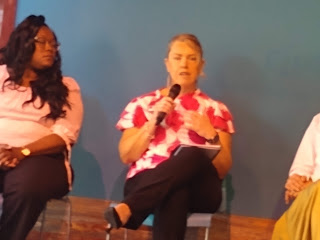Two years ago, at another one of the Gazette's invaluable Business Breakfasts, Andy Schumacher noted that when his restaurant Cobble Hill opened in 2013, he noticed that downtown office workers went home at 5 and that only sometimes would another crowd come downtown to replace them in the evening. He thought that more housing, at a variety of price points, might help to generate the round-the-clock buzz of a 24-hour downtown.
I thought about Andy's comment this morning, when we gathered to hear another panel talk downtowns in the Geonetric Building cafe. While today's speakers were focused on the retail sector, on this post-Euclidean blog, retail establishments are one element of a diverse neighborhood ecosystem. Context matters. "We're all in this together," as Red Green used to say.
 |
Today's panel (L to R):
Tasha Lard (Iowa City South District SSMID), Teresa Jensen (Cedar Rapids Bank & Trust), Deanna Trumbull (Iowa River Landing), Mark Seckman (Marion Economic Development Corporation), Betsy Potter (Iowa City Downtown District) |
Moderator Zach Kucharski, executive editor of the
Cedar Rapids Gazette, began by asking panelists what was working. There was a variety of good news to report: downtown Iowa City has filled all available retail space; Uptown Marion has a "coolness" that's attracting retail stores and restaurants; Iowa River Landing in Coralville is enjoying "great" traffic and sales; the city government in Cedar Rapids is working with downtown businesses to increase customer traffic; and the new South District in Iowa City is promoting and creating opportunities. Both Tasha Lard from the South District and Mark Seckman from Marion celebrated their working relationships with their cities' governments.
The retailers' concerns included needing space to grow (downtown Iowa City), persistently high interest rates, finding workers, the ongoing competition from online retailers, and in some cases shop owners' unhelpful closing hours. When Zach Kucharski asked about the importance of amenities, parking came up high on the list of customer concerns. The "place making" model of Iowa River Landing does anticipate visitors will park once and walk around the area, and downtown Iowa City has an unusual situation adjacent to the University of Iowa campus. Still, everyone had something to say about parking.
Kucharski's question about amenities had offered parking, events, and housing as examples. There were a number of successful events mentioned, Marion celebrated their new public library building and renovated central park, and Teresa Jensen brought a list of suggestions for downtown Cedar Rapids: redoing the 2nd Avenue bridge, occasionally closing 3rd Street, widening variety of live music, coworking spaces, food trucks, and more murals. Nobody talked about housing.
 |
| Teresa Jensen responds to a question from moderator Zach Kucharski |
Which brings us back to Adam Schumacher's comment from two years ago. While a number of panelists did talk about "24/7" retail areas, and working to appeal to different crowds at different times of the day, pretty much everyone took their working environment as external, something beyond their control. As a result, with the exception of Iowa City's campus-adjacent downtown, retailers were focused on bringing in visitors from elsewhere in their cities--hence the need for parking and big one-off events.
To be fair, the panelists mostly represented support organizations with little if any power even over types of stores or closing hours, much less their cities' land use and housing policies. Any influence they do possess is persuasive, through conversations with entrepreneurs, city officials, and citizen-shoppers. Still, they could be using those conversations to promote the type of urban context in which local businesses could be sustainably thriving. (Continuing to be fair, I was not able to ask the panelists about this; their answers could have been illuminating, and I surely owe each of them a shot at a guest appearance on Holy Mountain.)
A 24-hour downtown area that mixes retail, office, entertainment, and residential uses is the most economically, environmentally and fiscally resilient approach. Parking is a game at which you never can win, because unless we want to become a nation of big-box stores and strip malls, the appetite for more parking spaces is insatiable (cf.
Grabar 2023)--like the candy the witch gave the boy in
The Lion, The Witch and the Wardrobe. The core of Cedar Rapids is replete with surface parking, such that one can walk from the Geonetric Building to Coe College through parking lots. (This is actually true--
I've done it.) And while Betsy Potter from Iowa City suggested "parking education" might be a way to mitigate this insatiable demand, one engages in that at one's own risk.
 |
Downtown Cedar Rapids may have 99 problems, but insufficient parking is not one
(parking areas in red; screen shot of project by former Coe College student) |
A 24-hour downtown has vibe that hasn't been killed by swaths of parking. Many of your customers are right there, pretty much all the time, so you don't have to lure them in with events or hope that enough of them are in the mood today to get in their cars and "go shopping." A store I can walk to, especially
one that sells the necessities of life, is part of my neighborhood, to which I have more connection than some website. Stores we don't have to drive to are stores at which we don't have to find parking, a load off our minds as well as a load off the city streetscape.
But Cedar Rapids, Coralville, and Marion, and even much of Iowa City, are far from being this sort of town. A lot has to change, both physically and psychologically. In the meantime, retailers and those who support them have to operate in the towns we have built over the last 75 years. I understand that. Whether you're in sales or politics, you have to be responsive to public demand, which is largely shaped by how people have learned to navigate the world as it is. But some gentle nudges in the right direction would serve us all well.
The next Business Breakfast will be in Iowa City on July 9; they return to Cedar Rapids September 10.








No comments:
Post a Comment